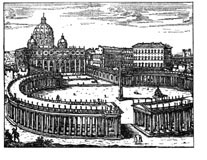
Piusmania 25 Years Later: Apology, Reaction & Remedy
GUEST COLUMN
This past March marked a quarter century since the Catholic Church officially apologized for what many believed to be her leaders’ inaction or indifference during the Holocaust. The apology, composed by Edward Cardinal Cassidy, president of the Holy See’s Commission for Religious Relations with the Jews, and cover letter by Pope St. John Paul II were both beautifully written, theologically minded, and, above all, a humble plea for forgiveness and reconciliation. John Paul II believed this was necessary as the Church continually calls her children to “purify their hearts, through repentance of past errors and infidelities,” and “place themselves humbly before the Lord and examine themselves on the responsibility which they too have for the evils of our time.” The apology, titled “We Remember: A Reflection on the Shoah” (March 16, 1998), encourages laity and priesthood alike to “discern” how “the image of the Creator in man has been offended and disfigured” and to wrestle with our own sinful nature when we depart from the Spirit of Christ. Make no mistake: This was, as Cardinal Cassidy put it, “an act of repentance” (teshuva) in which the Church sought to reconcile with her Jewish brethren.
Yet, some found it lacking in sincerity. Many looked upon the Church with accusatory eyes and wagged their fingers, and a few demanded retribution. They wished to see a public spectacle in which the Church would rend her garments rather than speak from her heart. They wanted a villain or scapegoat to whom to assign blame. Like the crowds shouting to Pilate for the blood of Christ, so, too, were the rabble ravenous for some form of reprisal, but in this go-round it was against the papacy, specifically Pius XII, the wartime pope whose memory was made to face the reproach of the present.
It did not begin with an all-out assault on the former Pontiff. The attacks were subtle at first, with many in the Fourth Estate taking slight jabs at the apology and its supposed shortfalls. Articles in BBC News, the Washington Post, and the Los Angeles Times attempted to cast the apology as a half-hearted justification of past sins. These set the stage for the coming onslaught. The articles did not find fault in the apology itself. Rather, they cried out that Pius XII was not thrown underfoot for his perceived apathy toward or lack of action on behalf of the plight of Jews in Nazi Germany. This, they believed, was indicative of a larger and more insidious issue within the papacy and Church. Blood was in the water, and it was not long before the sharks swarmed.
You May Also Enjoy
That fewer than 500 fanatic atheist Communists succeeded in overthrowing a deeply Christian nation is a lesson to be remembered.
The false charge that Pius was "Hitler's Pope" was designed to discredit not just a Pope, but the Church, Christianity, Western values, and even the very idea of religion.
Mindszenty was a Christian voice crying for freedom and liberation from behind the Iron Curtain at the height of the Cold War. The West barely heard his voice.

